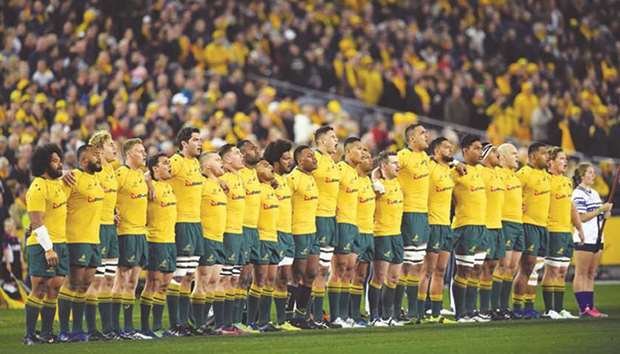Quo vadis rugby union? Where on earth is the game going in this country? Just when you thought things could not get any worse, they did on Saturday night and the Wallabies’ record 54-34 loss to the All Blacks in Sydney may have been the last nail in the coffin of Australian rugby, which has been on life-support for at least two years.
At the moment Australian rugby looks dysfunctional, delusional and just about dead and buried. But maybe, just maybe, there is a flicker of hope. On the same day as the Wallabies’ unacceptable performance against the All Blacks, an ARU media release went largely unnoticed. The ARU announced work would begin on a new model for high performance, which recognised the importance of grassroots rugby as well as playing, coaching and innovation.
Performance is the key word. In Australia the game has too often been about dollars, while in New Zealand it has always been about performance. This is the fundamental difference in the rugby cultures of the two countries, separated by a marginal sea just 2,000 kilometres across, yet so far apart.
For example, the ARU’s recent decision to cull the Western Force from Super Rugby was primarily a financial one. Australian rugby could not afford to maintain five Super Rugby teams.
The Force were cut not because they were in financial difficulty, but because the three traditional teams – the Brumbies, NSW Waratahs and Queensland Reds – were all struggling to varying degrees.
Getting rid of the Force was like throwing ballast off a sinking ship. Ironically, the Perth-based side was potentially the most financially secure of the lot with the support of mining magnate Andrew “Twiggy” Forrest, but someone had to go and they were the easiest to chop because of their “alliance” with the ARU.
New Zealand also wanted Australia to reduce to four teams, but for a different reason. The Kiwis had become deeply concerned about the decline in the standard of Super Rugby in Australia and to a lesser degree South Africa and actively pushed for the axing of teams.
While celebrating a great All Blacks win on Saturday night, coach Steve Hansen must have been horrified by what he saw from the Wallabies.
New Zealand needs a competitive Australia. All Blacks captain Kieran Read said the Bledisloe Cup was the second most important trophy to New Zealanders behind the World Cup. The All Blacks do not want to lose, but they would like to be tested.
When the All Blacks lost the second Test to the British & Irish Lions in June, Hansen’s response was: “We needed that.” With New Zealand’s 26-0 win-loss record against Australian teams in Super Rugby, the Kiwis had certainly not been tested by their Trans-Tasman rivals. Australia’s poor performance in Super Rugby has had an adverse effect on the Wallabies, who have been caught in a vicious cycle of failure.
In the past two years only one Australian team, the Brumbies, has reached the finals and they were knocked out in the first round on both occasions.
As a result, most of the Wallabies spent about a month not playing rugby before the start of the Bledisloe Cup and the Rugby Championship, entering the tournaments physically underprepared.
After spending more time together and gaining match fitness the Wallabies have produced respectable results on their end of season tours of Europe, raising false hopes that they have turned the corner, only for the vicious cycle to repeat itself with the ensuing Super season.
It is highly unlikely the Wallabies will challenge the All Blacks in Dunedin on Saturday night. They may not even trouble the resurgent Springboks.
And given the superb performance of the Lions against the All Blacks, the Wallabies will be hard-pressed to win a Test against any of the home nations on their spring tour.
So where to from there? Perhaps the concentration of playing talent will help Australia’s Super Rugby teams to become more competitive next year and this will have a positive flow on to the Wallabies.
But more importantly, the ARU’s renewed emphasis on high performance with a new “bottom up” approach may at last lead Australian rugby in the right direction.

Wallabies’ record 54-34 loss to the All Blacks in Sydney on Saturday may have been the last nail in the coffin of Australian rugby, which has been on life-support for at least two years. (AFP)
